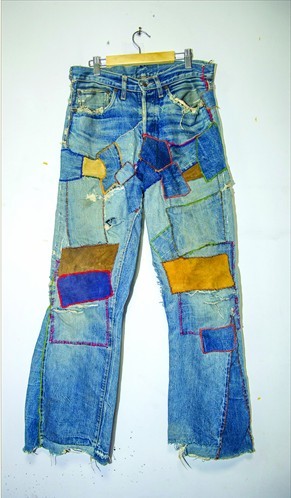 |
| A vintage denim outfit at Liang Wei's store. Photos: Li Hao/GT |
Foreign stigma and superstition
Liang's passion for vintage culture dates back to the late 1980s, which he claims was the last time he bought new clothes.
Aside from legal hurdles in importing secondhand clothes, there is also a cultural backlash against wearing clothes owned by someone deceased. Superstition in China holds that wearing a dead person's clothes can displease the owner's ghost.
Liang said he is frustrated by people who claim vintage goods are "foreign trash" because most come from overseas.
"Secondhand, vintage and retro clothes as well as so-called foreign trash represent totally different concepts," said Liang. "Trash is a derogatory word. Michael Jackson's clothes fetched high prices at auctions after his death. Are they foreign trash? If the clothes are of high quality and look good, they deserve to be recycled. Only clothes that look bad can be called 'trash.'"
On taobao.com, China's largest online marketplace, many clothes, bags and accessories for sale are dubiously labeled as "vintage" or "single item." A regular shopper on the website, surnamed Hu, claimed she purchased a few shirts and dresses advertised with such labels about two months ago. When they were delivered, she was shocked to discover the clothes "were dirty and stank."
"The vendor was said to be located in Shanghai but the package was mailed from Guangdong Province, which made me suspicious. Customers should be careful and not buy clothes that possibly belonged to someone deceased because they could carry viruses," said Hu, who returned the clothes.
The Global Times reported on May 20 that a smuggling ring based in Jieshi, a coastal town administered by the city of Lufeng, Guangdong Province, was distributing and selling secondhand clothes imported from overseas. Insiders claimed many of the clothes were taken from dead bodies, leading Jieshi to earn an unwanted reputation nationally as a source of dead people's clothes.
